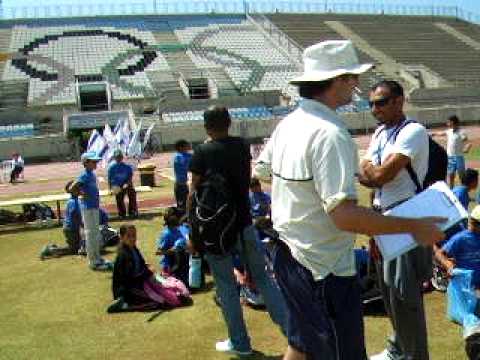The Israel Cricket Association has launched a new initiative to bring Bedouin and Jewish children closer together over a bat and a ball.
He’s coached at a British institute where the laws of cricket are staunchly guarded. Now Herschel Gutman is taking England’s national sport – played in over 100 countries – and is using it as a vehicle for peace in Israel.
Cricket in Israel has been popular since the time of the British mandate, and is keenly played today among Israel’s 80,000 Indian Jews who immigrated to development cities in Israel such as Lod, Ramle, Ashdod and Beersheva, bringing with them their love for the gentleman’s sport.
Although a number of Israeli teams head to European competitions every year, the Israel Cricket Association, which organizes them, is yet to see an Arab or Bedouin member of Israeli society join the sport.
As a new immigrant to Israel himself, Gutman plans to change the way cricket is played in Israel, and hopes to bring all members of the country on board while using it as a vehicle for reconciliation.
Unlike soccer, football, rugby or ice hockey – the latter doesn’t work that well in Israel due to the heat any way – cricket is a competitive but non-combative sport. It requires reflection, patience and skill, and gives players an opportunity to relate to each other as they wait up to 15 minutes of time for play.
A sport that teaches tolerance
“There is no shoving and no pushing,” Gutman tells ISRAEL21c, while taking a break from his intensive Hebrew language lessons. “You need patience and the ability to sit back sometimes and to look [at the game] as an outsider and analyze it.”
While in soccer, players spend their time running around, cricket involves a lot of time spent “sitting around watching the team play and not being overly involved,” says Gutman. And this is where the peace part comes in: “Patience is important for learning tolerance,” he says.
The idea to connect Israeli Bedouin kids to their Jewish neighbors through cricket came from within, and was catalyzed by a UK group Cricket4Change. A teacher from the Bedouin town Hura, in the Negev Desert had contacted George Sheader, the cricket development officer in Israel.
The teacher told Sheader that he was keen to teach cricket to his kids at school. The Hura teacher was given a cricket set, pamphlets, a booklet and coaching course on how cricket is played.
Batting to include all members of society
Not long after, the UK organizer, Cricket4Change, jumped on board when its members came to Israel to lend expertise in a four-day seminar to teach the rules of the game. In the UK and in other countries, Cricket4Change uses cricket as a means to build peace and trust.
Earlier this month, the kids met at the Hadar Yosef Stadium in Tel Aviv where the Israel Cricket Association launched the program. Among them were 30 Bedouin kids from Hura.
Since the event, the Bedouin and Jewish kids from the towns of Hura and Beersheba have had two practice sessions together, and Gutman is looking to connect with other Bedouin schools and towns to help the idea grow.
The children fit into two groups – from 9 to 12, and from 15 to 18. About 60 have been involved until now he says. There are additional effects built into the idea: Many of the older kids from the Bedouin population are problematic kids, who’ve been in jail before. Organizers believe their involvement is an opportunity to help them reform, as they learn to be coaches and mentors to the younger kids.
A bat and ball game played first in the16th century in southern England, cricket is today an international sport that is much loved in countries such as Australia, South Africa, India, the UK and Bangladesh.
Gutman, who is 33 and engaged to be married, immigrated to Israel less than two months ago, and after spending some time here in 2001, is a perfect mentor for the program.
Skilled and optimistic, “My background is a cricket coach – I studied through the Cricket Board. Then I was on the coaching staff at Lords MCC,” he says.
The Israel Cricket Association has two divisions, a Senior A and B division, which meet for play a few times a month. There are three junior teams as well.
“We have a tournament next year and it would be great to have them playing in the Israeli national team,” says Gutman of his new Bedouin recruits. It might be too soon for them, but hopefully they’ll be practicing and making friends in the meantime.













